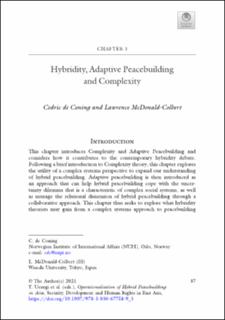| dc.contributor.author | De Coning, Cedric | |
| dc.contributor.author | Mcdonald-Colbert, Lawrence | |
| dc.date.accessioned | 2021-04-27T08:22:59Z | |
| dc.date.available | 2021-04-27T08:22:59Z | |
| dc.date.created | 2021-04-14T17:47:09Z | |
| dc.date.issued | 2021 | |
| dc.identifier.isbn | 978-3-030-67757-2 | |
| dc.identifier.uri | https://hdl.handle.net/11250/2739809 | |
| dc.description.abstract | This chapter introduces Complexity and Adaptive Peacebuilding and considers how it contributes to the contemporary hybridity debate. Following a brief introduction to Complexity theory, this chapter explores the utility of a complex systems perspective to expand our understanding of hybrid peacebuilding. Adaptive peacebuilding is then introduced as an approach that can help hybrid peacebuilding cope with the uncer- tainty dilemma that is a characteristic of complex social systems, as well as manage the relational dimension of hybrid peacebuilding through a collaborative approach. | |
| dc.language.iso | eng | en_US |
| dc.relation.ispartof | Operationalisation of Hybrid Peacebuilding in Asia: From Theory to Practice | |
| dc.rights | Navngivelse 4.0 Internasjonal | * |
| dc.rights.uri | http://creativecommons.org/licenses/by/4.0/deed.no | * |
| dc.subject | Fredsoperasjoner | |
| dc.subject | Peace operations | |
| dc.subject | Nasjonsbygging | |
| dc.subject | Nation-Building | |
| dc.title | Hybridity, Adaptive Peacebuilding and Complexity | en_US |
| dc.type | Chapter | en_US |
| dc.description.version | publishedVersion | |
| dc.subject.nsi | VDP::Statsvitenskap og organisasjonsteori: 240 | |
| dc.subject.nsi | VDP::Political science and organisational theory: 240 | |
| dc.subject.nsi | VDP::Internasjonal politikk: 243 | |
| dc.subject.nsi | VDP::International politics: 243 | |
| dc.source.pagenumber | 37-58 | en_US |
| dc.identifier.cristin | 1904158 | |
| cristin.ispublished | true | |
| cristin.fulltext | original | |
| cristin.qualitycode | 2 | |

